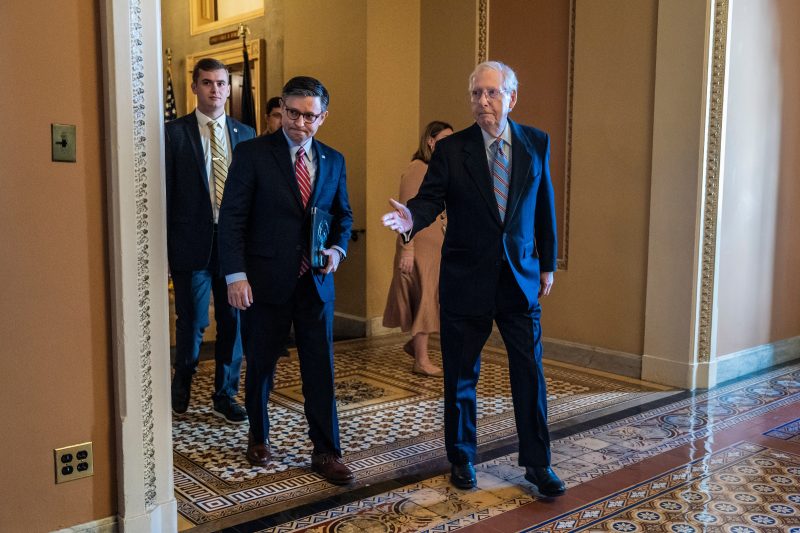January 19, 2024
The House GOP’s Immigration Bill: A Looming Dilemma
 The House GOP’s Growing Dilemma on the Immigration Bill
The issue of immigration has long been a hot-button topic in American politics, and it remains at the forefront of public discourse today. With a new administration in place and a renewed focus on comprehensive immigration reform, the House GOP is facing a growing dilemma on how to approach this complex and politically sensitive issue.
The Republican party has historically taken a tough stance on immigration, advocating for stricter border control and emphasizing the importance of national security. However, as the demographics of the country change and public opinion evolves, there is increased pressure for the GOP to adopt a more moderate approach to immigration in order to remain relevant and appeal to a wider base of voters.
One of the main challenges for the House GOP is finding a balance between satisfying their conservative base, who are demanding stricter immigration policies, and appealing to the growing number of Republican voters who support a more compassionate and inclusive approach. This dilemma is highlighted by the division within the party, with some members pushing for a hardline approach while others advocate for comprehensive immigration reform.
The House GOP also faces the challenge of reconciling their policy positions with the realities of governing. Despite the party's rhetoric about the need for tough immigration policies, certain industries and sectors rely heavily on immigrant labor. Republicans from agricultural states, for example, understand the valuable contributions of immigrant workers to their local economies and are more open to finding a solution that allows for a controlled but steady flow of workers.
Another factor that adds to the House GOP's dilemma is the changing demographics of the American population. The Republican party has traditionally struggled to attract minority voters, and taking a hardline stance on immigration can further alienate these groups. With the Latino population projected to become a major voting bloc in the coming decades, it is crucial for the GOP to be mindful of their policies and rhetoric on immigration in order to avoid a long-term decline in support.
Additionally, the House GOP must consider the political consequences of their decision on immigration. By taking a hardline stance, they risk galvanizing Democratic opposition and potentially alienating moderate voters who play a crucial role in swing districts. On the other hand, if they choose to embrace a more moderate approach, they risk backlash from their conservative base, which could result in primary challenges and internal divisions within the party.
The current political landscape further complicates the House GOP's dilemma. With a Democratic-controlled Senate and a slim majority in the House, Republicans face obstacles in passing any significant legislation on immigration. This raises questions about the effectiveness of pursuing comprehensive reform versus incremental changes that may be more achievable in the short term.
In conclusion, the House GOP finds itself facing a growing dilemma on how to approach the immigration bill. Balancing the demands of their conservative base with the need for a more inclusive and compassionate approach is a significant challenge. Furthermore, the changing demographics of the American population and the political consequences of their decision add further complexity to the issue. It remains to be seen how the House GOP will navigate this delicate situation and find a solution that is both politically feasible and aligned with the values of their party.
The House GOP’s Growing Dilemma on the Immigration Bill
The issue of immigration has long been a hot-button topic in American politics, and it remains at the forefront of public discourse today. With a new administration in place and a renewed focus on comprehensive immigration reform, the House GOP is facing a growing dilemma on how to approach this complex and politically sensitive issue.
The Republican party has historically taken a tough stance on immigration, advocating for stricter border control and emphasizing the importance of national security. However, as the demographics of the country change and public opinion evolves, there is increased pressure for the GOP to adopt a more moderate approach to immigration in order to remain relevant and appeal to a wider base of voters.
One of the main challenges for the House GOP is finding a balance between satisfying their conservative base, who are demanding stricter immigration policies, and appealing to the growing number of Republican voters who support a more compassionate and inclusive approach. This dilemma is highlighted by the division within the party, with some members pushing for a hardline approach while others advocate for comprehensive immigration reform.
The House GOP also faces the challenge of reconciling their policy positions with the realities of governing. Despite the party's rhetoric about the need for tough immigration policies, certain industries and sectors rely heavily on immigrant labor. Republicans from agricultural states, for example, understand the valuable contributions of immigrant workers to their local economies and are more open to finding a solution that allows for a controlled but steady flow of workers.
Another factor that adds to the House GOP's dilemma is the changing demographics of the American population. The Republican party has traditionally struggled to attract minority voters, and taking a hardline stance on immigration can further alienate these groups. With the Latino population projected to become a major voting bloc in the coming decades, it is crucial for the GOP to be mindful of their policies and rhetoric on immigration in order to avoid a long-term decline in support.
Additionally, the House GOP must consider the political consequences of their decision on immigration. By taking a hardline stance, they risk galvanizing Democratic opposition and potentially alienating moderate voters who play a crucial role in swing districts. On the other hand, if they choose to embrace a more moderate approach, they risk backlash from their conservative base, which could result in primary challenges and internal divisions within the party.
The current political landscape further complicates the House GOP's dilemma. With a Democratic-controlled Senate and a slim majority in the House, Republicans face obstacles in passing any significant legislation on immigration. This raises questions about the effectiveness of pursuing comprehensive reform versus incremental changes that may be more achievable in the short term.
In conclusion, the House GOP finds itself facing a growing dilemma on how to approach the immigration bill. Balancing the demands of their conservative base with the need for a more inclusive and compassionate approach is a significant challenge. Furthermore, the changing demographics of the American population and the political consequences of their decision add further complexity to the issue. It remains to be seen how the House GOP will navigate this delicate situation and find a solution that is both politically feasible and aligned with the values of their party.
If you would like to delve into the world of investment topics , go to our partner project Wall Street Wizardry


